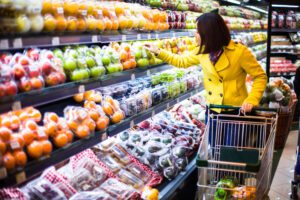Food inflation cooled slightly in May as lower energy and commodity costs finally showed signs of filtering down to consumers.
According to data by the British Retail Consortium, grocery inflation fell to 15.4 per cent in during the month, down from 15.7 per cent in April – but remained the second highest inflation rate in the food category on record.
As supply issues eased and weather improved fresh food inflation also dropped to 17.2 per cent, down from 17.8 per cent in April. This is below the three-month average rate of 17.3 per cent.
“Fierce competition between supermarkets has helped keep British food among the cheapest of the large European economies,” Helen Dickinson, chief executive of the British Retail Consortium, said.
While the cost of some goods eased, shoppers still saw the cost of ambient food such as tinned goods rise during the month, rising to its 13.1 per cent up from 12.9 per cent.
While reports suggest that food inflation may have peaked households across the UK are still struggling with an increased cost of living, with rumours suggesting that Downing Street could introduce a cap on food staples to help families with price hikes.
The scheme, which is understood to be at drawing board stage in Number 10, would ask retailers to charge to lowest possible price for household basics such as bread and milk.
“Food inflation is much more resilient and difficult to get rid of than we anticipated,” a treasury source told the Sunday Telegraph, who first reported the news.
Its understood that supermarkets would be allowed to choose which items they cap and would only take part in the scheme on a voluntary basis.
However, Andrew Opie, director of food and sustainability at the BRC, said he was sceptical about the plans working.
“This will not make a jot of difference to prices. High food prices are a direct result of the soaring cost of energy, transport, and labour, as well as higher prices paid to food manufacturers and farmers,” he said.
“As commodity prices drop, many of the costs keeping inflation high are now arising from the muddle of new regulation coming from government. Rather than recreating 1970s-style price controls, the government should focus on cutting red tape so that resources can be directed to keeping prices as low as possible,” he added.
Read more:
Food inflation cooled in May as lower energy costs filter down to consumers


























